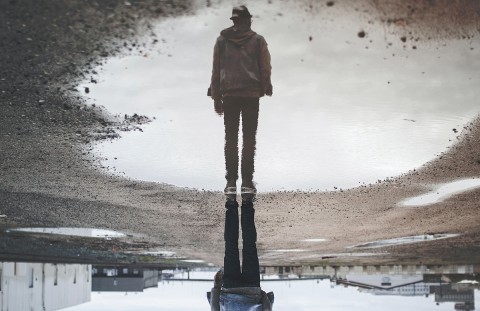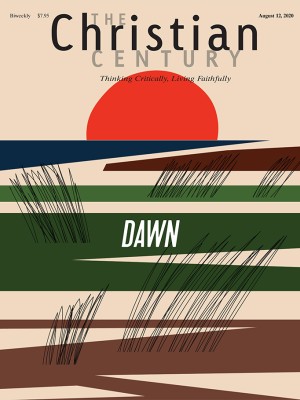
As COVID-19 sweeps disastrously through the United States and elsewhere, some communities have taken action in a way that just a few months ago might have seemed unimaginable: slowing down, doing less. In order to flatten the curve, people with the privilege to do so have stayed home from work, school, and events. They have slowed down, compelled to find new rhythms and different patterns for life.
This has all happened at the very same time that our planetary home is, in Greta Thunberg’s words, on fire.
Anthropogenic—or human-caused—climate change is the result of an economic model that suggests that limitless growth is possible despite the very real ecological limits our planet presents. This perspective encourages accelerating, streamlining, and generally increasing production—all for the sake of profit, and with little concern for the earth.
Read our latest issue or browse back issues.
A globalized economic system means that the ground beneath my feet no longer needs to provide for my needs. I don’t need to grow my food, assuming I even have the space to do so, because that’s already being done elsewhere. It matters not if this ground has been contaminated or rendered infertile by lead poisoning, coal ash pollution, or nuclear radiation, because elsewhere the land is still productive and the environment is pure.
There is a double fallacy here: the delusion that the land here need not be cared for because land will be cared for elsewhere and the misconception that the environment is somehow separate from the human, rather than that with which we are suffused and intimately entangled.
Global capitalism can only function through exploitation, leaving no room for nurture, for care. This is because this system is undergirded by a shared logic, rendering both people and the planet into commodities to be consumed in the forms of labor and natural resources.
Some have suggested that humans themselves are the problem. In fact elitism and exploitation constitute the cause. The wealthiest few are the most responsible. Neither climate change nor the current pandemic happened by chance. Both are the result of denial, of a refusal to believe scientists, of a prioritization of wealth for a few as opposed to wellness for many. And in both cases, the people least responsible—poor folks, communities of color, the unhoused, the incarcerated—bear the brunt of the burden.
This doesn’t mean that you and I are off the hook. It means that we’re tasked with using whatever agency we possess to imagine and cocreate communal structures of radical equity, relentless compassion, and just accountability. If we want the planet to thrive as it once did, different rhythms and patterns are necessary. Some of these rhythms and patterns will need to be both remembered and created. These ways of life will likely need to be slower than the ones we are used to living—at least for those of us in the industrialized Global North.
This pandemic is not a blessing in disguise; it’s a tragedy. Still, I wonder what this moment, which has disturbed our habits and undermined our routines, might have to teach us. What might we learn from this slowing down?
In my work as an educator seeking to combat climate injustice, I’ve encountered all sorts of obstacles. One of the major ones is this: sustainable modes of living, for those with the privilege and resources to enact them, are often not pleasurable.
This raises two important questions: Who has access to these resources? And, for those who do have access, why isn’t sustainable living, in its most common forms, pleasurable? As queer ecologist Catriona Sandilands puts it, “it is not only that abundant pleasure is virtually absent in (most) ecological discourse, but that it is often understood as downright opposed to ecological principles.”
“The problem with this sort of ethical appeal,” adds feminist philosopher Stacy Alaimo, “is that it is hardly appealing.”
Making these changes is hardly appealing because it demands much time and effort—and because it requires us not only to rid ourselves of old pleasures but also to labor to find new ones. For those with access to resources, the quickness of a flight to some alluring destination is, on the surface, far more pleasurable than the slowness of staying close to home. But with this quickness comes great harm: vast emissions, sickening waste, clamorous noise. Slowing down helps us see the injustice that had yet remained unseen.
Many of our ordinary ways of finding pleasure in life have not been available lately. Parks have been closed, concerts canceled, theaters shuttered, friends quarantined. And none of these losses of pleasure even begins to convey the grief and trauma that accompany illness and death. To maintain social distance forces different cadences of life and novel opportunities to endeavor to find pleasure. Indeed, this moment affords—if not imposes—a contemplative pause to reconsider the networks of capitalistic consumption in which we find ourselves and from which we have derived pleasure.
It may yet be the case, paradoxically, that seeking justice in and for this world can be realized as we do less, as we slow down—as we not only refrain from but reject the cycles of consumption so often tied to our quick and ever-quickening lives. Indeed, this crisis may carve space for critical reflection on what had yet gone unnoticed in our lives. Slowing down presents new opportunities to seek pleasure in smaller, simpler ways: mending, baking, writing, storytelling, creating, listening.
Slowing down augments our capacity to notice new ways of living, new connections yet to be made, yet to be regenerated. To notice is to be curious, to abide, to become attentive to, to demonstrate compassion toward. Cultural theorist Anna Lowenhaupt Tsing offers the phrase “arts of noticing” to describe this careful process of tending to the precarious, of cultivating life amid the rubble of an uncertain world. Finding new pleasures is predicated on a capacity to notice—the quiet, the slow, the still, the unheard, the silenced. As Tsing writes, “only an appreciation of current precarity as an earthwide condition allows us to notice this—the situation of our world.”
To attend to the precarious, to the vulnerable, carries with it a spiritual depth that resonates deeply with the Christian tradition. What good would the Israelites’ cries have been had the Divine not heard, not noticed? What if Elijah had not listened for that voice that met him at the entrance of the cave? Could the good Samaritan have been good without first noticing a man in anguish alongside the road? Could the faithful woman who reached out for Jesus’ cloak have been healed had he not noticed her touch?
To notice is the first step toward embodying compassion, toward enacting justice. One cannot care for what one has yet to notice; to love is not to trample over but to notice and to tend.
We may yet emerge from our social distance, however soon or late, with reshaped perspectives on meaningful modes of living, on models for justice-seeking community. What might we learn from the strange ways in which slowness may be a resolution to the fast-moving nature of both COVID-19 and the climate crisis? The fullness of these lessons is still unknown, still to come.
But we might begin by noticing: noticing the ways in which our lives intersect with and participate in systems of injustice, noticing the ways in which our communities are caught up in structures that disempower and harm, noticing opportunities to divest from and dismantle these structures. It is our responsibility to craft communal structures that better notice and account for those who’ve slipped through the cracks, who’ve been forced to the margins. And it is our responsibility to do so not as saviors but as coconspirators with those who have been cast aside, those whose cries of “I can’t breathe” echo in the streets.
And to notice requires that we slow down whenever possible. Perhaps this slowing down might just be what’s needed in this moment to create a bit of shalom in our midst.
A version of this article appears in the print edition under the title “Global slowdown.”






